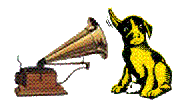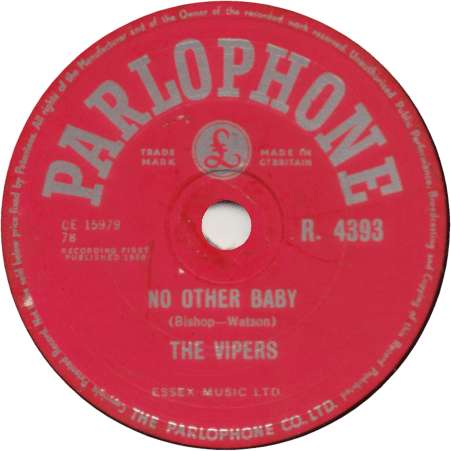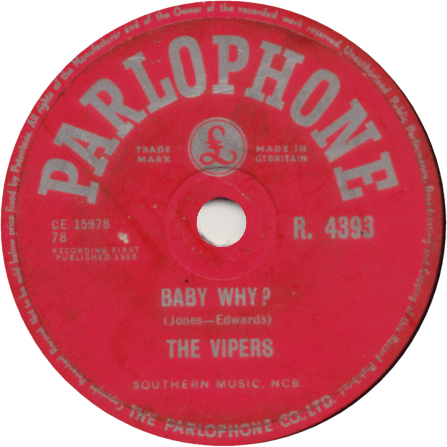
The Beatles
at 78 RPM
|
Cool 78 of the Month July 2006 |
|
The Vipers No Other Baby Parlophone R 4393 (UK) Early 1958 |

|
|
The Vipers began life in the mid 1950s in the UK as a skiffle group, known appropriately as The Vipers Skiffle Group. It was a time when every kid in the UK could pick up an old tea chest and a washboard, couple them then with an American folk song, and voila, form a skiffle group. It was this competition, particularly from Lonnie Donnegan, that saw them drop Skiffle from their name, move to a more rock'n'roll sound, and have a direct influence on Paul McCartney and the Merseybeat sound. Wally Whyton and his mates, Johnny Martyn, Jean Van der Bosch, Tony Tolhurst, and John Pilgrim would figure prominently in the early incarnation of the group. Starting as amateurs they eventually signed to Parlophone and released Ain't You Glad b/w Pick A Bale Of Cotton (Parlophone R4238) in 1956. While this didn't chart, their next release, Don't You Rock Me Daddy-O b/w 10000 Years Ago (Parlophone R4261) would make it to number 10 in the UK charts and even be released in the US on Capitol (catalogue number F3673). This release set off a fierce competition between the Vipers and Donnegan. During their heyday at the 2i's coffee bar, the group would also count Tommy Steele as a memeber as well as both Bruce Welch and Hank Marvin who went on to back Cliff Richard as a part of The Shadows. As skiffle began to fade in the latter part the 50s, The Vipers Skiffle Group would also undergo changes. This fade in popularity left room for only one king of skiffle and that was Lonnie Donnegan. Wally took the group in a more rock'n'roll direction, dropping Skiffle Group from their name, and hoped for more hits. In 1958 they recorded Baby Why, a song that had been a top 10 hit for American Country and Western star George Jones in 1955 as composer and performer. George Jones' version was known as Why Baby Why. The Vipers managed to make take it straight from the country into rock'n'roll with the addition of an instrument never heard in skiffle or country, that being a saxophone. It is the B-side that we are particularly interested in though. No Other Baby, written by Dick Bishop and Bob Watson, was recorded in 1957 by Bobby Helms. Bobby is famous for the top country and pop hits My Special Angel and Jingle Bell Rock. The Vipers added a rock'n'roll beat with a prominent electric guitar straight of out Merseyside, that can later be heard in its fullness in the Beatle's early recordings. The Vipers would fail to chart with this release, and Wally Whyton turned to television, presenting Five O'Clock Club and Time For a Laugh on commercial TV in the UK, and as a presenter of country and folk programmes on BBC Radio 2 throughout the 1990s until his death in 1997 at age 67. In 1999, Paul McCartney would record his album, Run Devil Run, a compilation of, at times, obscure 1950s rock'n'rollers. The track chosen for a single from it, was No Other Baby, backed with Buddy Holly's Brown Eyed Handsome Man and a track called Fabulous. Paul would release No Other Baby and the Run Devil Run album in almost every format from CD, CD single (both mono and stereo), Mini-Disc, to a box set of 7 inch singles. Unfortunatley there was no release of what would have been a cool 78 of No Otber Baby, and fortunately no release of the album on 8-Track or cassette! Paul claims in the liner notes to have never heard The Vipers' version of No Other Baby. As his rendering is more like that of Bilie Davis' version from the 1960s, slow and bluesy, this is understood. For a real treat and a listen to the early days of the 'Beat', you'll want to give this cool 78 a good listen. |
|
A Side The Vipers Baby Why? |

|
